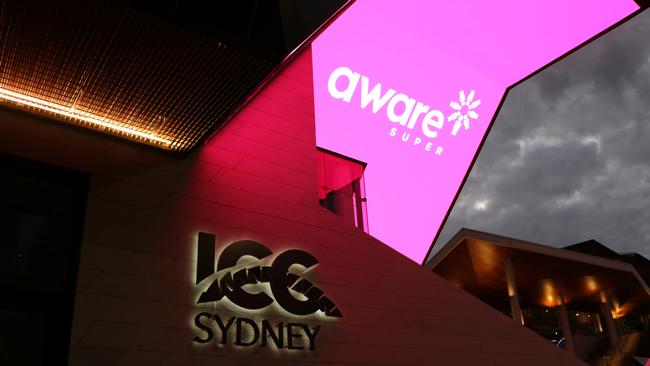Top Australian super funds to use voting power to push for change during AGM season
Australia’s major superannuation funds, armed with ever-growing stakes in the country’s largest listed companies, are preparing to use their voting power to curb boards and influence policy.
Australia’s major superannuation funds, armed with ever-growing stakes in the country’s largest listed companies, are preparing to use their voting power during the upcoming annual meetings season to curb unruly boards and influence policies on emission targets, executive pay, gender diversity and other key issues.
Super funds say how they vote during the action-packed schedule of annual meetings in October and November will help protect the retirement savings of millions of Australians.
Qantas is firmly in the sights of super funds, which want accountability following a spate of bad publicity and the controversial early exit of chief executive Alan Joyce, who departed with a hefty bonus.
Companies are under increasing pressure to consider the views of super funds, which held assets worth $3.5 trillion as of March. And funds are getting bigger with the compulsory super guarantee rate set to reach 12 per cent in 2025, up from 9.5 per cent in 2020.
Super funds’ ownership of the 10 largest companies listed on the ASX has more than doubled in the past 12 months to $60bn.
Super funds now own 6.3 per cent of Woodside, compared to 0.5 per cent in September 2022, with investments surging after a rally in global oil prices. Ownership of BHP, CSL, Wesfarmers and Westpac has almost doubled.
Funds now control 1.55 per cent of Fortescue Metals, compared to 0.12 per cent this time last year, according to Bloomberg.

Aware Super is the most significant Australian super fund shareholder for the 10 largest listed companies, followed by HESTA, Rest and the Australian Retirement Trust.
Australian Council of Superannuation Investors (ACSI) head of stewardship Ed John told The Australian that super funds took a long-term approach to their investments and as a result campaigned for issues that were in the long-term interest of its members.
“Ultimately, it’s the long-term success of those companies that contributes to the sort of retirement outcomes for members,” he said.
“It’s become more and more common for super funds and fund managers to use their votes at AGMs as an opportunity for investors to promote good governance and to endorse the actions of companies … or express concern over poor practices.
“Where there is a concern over governance issues or executive pay not being aligned to long-term performance then potentially these shareholders will either vote no or move to raise their concerns.”
HESTA, ART and Aware Super are among the super funds in talks with businesses ahead of annual meetings and preparing to take action.
ART, created last year from the merger of Sunsuper and QSuper, has committed to pressuring 88 companies to slash their carbon footprint, setting a new “net zero” road map to cut emissions in its portfolio of equities, infrastructure and real estate investments by 43 per cent by 2030.

It said that it would start voting on all climate-related shareholder proposals, actively engage with the companies and “actively vote” at annual meetings for all 88 from July 1.
HESTA has put the chairs and CEOs of the 292 largest ASX-listed companies it invests in on notice, seeking to engage with them on policies relating to climate, “decent work”, gender diversity and biodiversity loss.
Aware Super head of responsible investments Liza McDonald said that the fund was engaging with companies it directly invested in via its fund managers and through industry groups such as the ACSI.
“This engagement process is ongoing – it doesn’t only happen ahead of AGMs – but it can be particularly nuanced during the AGM season, given that at this point, conversations with companies will also be informed by the resolutions to be put to shareholders,” she said.
Ms McDonald added that most conversations were centred around the company’s financial performance, but it also took environmental, social and governance (ESG) issues very seriously.
“Companies that handle these (ESG) issues poorly will struggle to deliver strong returns over the long term, and these investments are at higher risk of becoming stranded assets,” Ms McDonald said.
“This engagement strategy has delivered positive results and it’s one we’ll continue to employ as we balance return and risk considerations in all our investments.
“Executive pay, climate transition plans, corporate culture and gender diversity in leadership are among the ESG issues we regularly discuss with companies, and this AGM season will be no exception.”
Ms McDonald said Aware had engaged directly and collaboratively with 51 companies in the past financial year about remuneration reports to produce positive outcomes such as transparent disclosure of bonuses and performance hurdles.

Of the 304 remuneration reports Aware Super voted on, it opposed 37, or 12 per cent.
Industry experts say that Qantas’s annual meeting in November will be frosty, with institutional shareholders uneasy about the many problems left behind by Mr Joyce, as chairman Richard Goyder attempts to shore up his position amid calls for him to exit.
ACSI, which campaigns on behalf of super funds over ESG-related issues, said it would be watching out for how the board justified any bonuses given to Mr Joyce, considering the problems.
ACSI chief executive Louise Davidson said last week’s annual report had “no discussion of board accountability for ongoing customer issues, the recent High Court decision and the ACCC investigation”.
“That is what investors would like to understand,” she said.
The airline’s reputation has taken a significant bruising over the past month after a High Court ruling that Qantas had illegally sacked 1700 workers.
The Australian Competition & Consumer Commission added to the pain, launching legal action over claims that the carrier had sold tickets for flights that had already been cancelled.
HESTA said the Qantas board “should consider all actions available to them” to restore public confidence and brand trust in the company they manage for shareholders.
Superannuation funds, among other shareholders, are also expected to be asked to vote on climate polices.
Explosives maker Orica is expected to seek endorsement of its accelerated climate action plan, which aims to reduce net operational Scope 1 and 2 emissions by at least 45 per cent by 2030, from 2019 levels.






To join the conversation, please log in. Don't have an account? Register
Join the conversation, you are commenting as Logout